Unit 1: Lesson 1
Unit 1 Lesson 1

Lesson 1 Overview
Now is time for us to start our first lesson, we are going to begin introducing some vocabulary. Make sure you read, listen and repeat after for pronunciation. The following set of flashcards is going to show you some of the most important vocabulary we will need for this lesson. On this unit we will be talking about Health “La Salud”
Excelente !
After looking and listening to the vocabulary in context and flashcards we are going to take a look at the preterite. The preterite is a tense used to express an action completed at a definite time in the past. This tense is usually referred to as the past tense in English. In English, regular verbs in the past tense end in - ed.
You lifted weights yesterday. Usted levantó pesas ayer. (past tense) (preterite)
Now let’s take a look at how to form preterite tenses with -ar verbs. Use the preterite tense to talk about actions completed in the past. How do you form the preterite of regular -ar verbs? Here's how: To form the preterite of a regular -ar verb, add the appropriate preterite ending to the verb's stem.
nadar to swim
- nadé
- nadamos
- nadaste
- nadasteis
- nadó
- nadaron
Notice that the yo and usted/él/ella forms have an accent over the final vowel.
Nadé en el mar. Swam in the sea.
Mariana patinó. Mariana skated.
The nosotros(as) form is the same in the preterite as in the present tense.
Caminamos en la playa anoche. We walked on the beach last night.
After looking at the written explanation for our preterite tense let’s take a look at our friends explaining this concept in the following video 1. Make sure you take notes and /or take a look at the video more than once.
Now that we took a look at all the vocabulary and grammar concepts we are ready to watch the first part of the video story. In this video 2, story we can listen and see characters interact and apply all the grammar and vocabulary in a real life situation. Notice the words Isabel and Mario use to talk about what happens to Mario. Then use doler to say what hurts and make excuses.
NOTE: Listen for the action.
This scene has a lot of action.
Listen to what happens to Mario.
What does Isabel do and say in response?
Will they go to their planned destination?
You can follow the story by reading the following:
Mario: ¡Tenemos que ser los primeros aficionados en el estadio!
Isabel: Mario, sabes montar en bicicleta?
Mario: Sí, sí, ¡es fácil!
Isabel: ¡Necesitas el casco!
Mario wobbles on his bicycle and crashes into a fruit cart.
Mario: ¡ No estoy herido!
Isabel: Pero, el tobillo? y la pierna?
Mario: Soy fuerte y sano...
Isabel: Y la cabeza, ¿Mario? ¡Tienes la piel muy roja! ¡La nariz! Abre la boca. Puedes caminar?
Mario: Sí. Me duele un poco el pie... pero puedo caminar.
Isabel: No, no debes caminar.
Mario: Pero... ¡Y Trini Salgado!
Isabel: Trini Salgado? ¡Un autógrafo no es importante! Vamos… to be continued ! (continuará)
